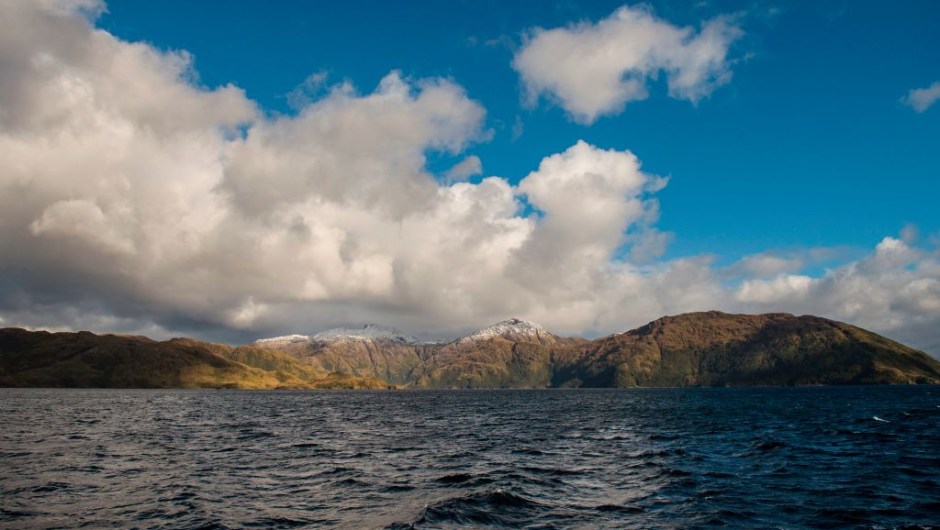(Credit: MARTIN BERNETTI / AFP via Getty Images)
(CNN Spanish) -
The new controversy between Chile and Argentina has a name: "the gateway to Antarctica."
It covers an area of approximately 30,500 square kilometers in one of the southernmost areas of the planet.
It all started with a decree from the President of Chile Sebastián Piñera.
There he announced that he had expanded the continental shelf of his country by some 30,500 square kilometers.
According to Argentina, 5,500 of them belong to Argentina and the rest are universal heritage.
"Chile with this untimely decree, appropriates", accused the Argentine Foreign Minister, Felipe Solá.
For his part, his Chilean counterpart, Andrés Allamand, claimed that "no one appropriates what belongs to him."
This new controversy raises alarms because the last antecedent between the two countries was the dispute over the Beagle Channel, a dispute that almost led to war in 1978 and ended with the Treaty of Peace and Friendship signed in 1984.
Former ad hoc judge of the International Court of Justice Raúl Vinuesa maintains that the current controversy is "completely different" from that of the Beagle Channel since, according to his vision, the current problem is "purely legal." In fact, Chile and Argentina each defend their position with the same documents: the Treaty of Peace and Friendship and the Convention on the Rights of the Sea. "You have to interpret those texts," Vinuesa synthesized.
The 1984 Treaty of Peace and Friendship projected a line that divided the exclusive economic zones and continental shelves of each country to the south of their territories.
This line established that to the west Chile has sovereignty and the east, Argentina.
The problem is that this line does not reach Antarctica but its trajectory ends in the high seas at a coordinate called “point F”.
The controversy revolves around what happens south of “point F”, where Chile expanded its platform.
According to Article 7 of the Treaty, Chile's exclusive economic zone extends to the west of the line, delimiting the east with the high seas.
advertising
Argentine Foreign Minister Felipe Solá expressed his country's interpretation: "It says Chile can have an exclusive economic zone to the west, not to the east."
However, the Chilean Foreign Minister affirmed that the east also belongs to his country "in full law."
The expansion claimed by Chile overlaps with an Argentine platform of 5,500 square kilometers, which was recognized as such by the United Nations Commission on the Limits of the Continental Shelf in 2017. This was the result of Argentine efforts that had begun in 2009, according to the Foreign Ministry of that country.
"If there was no prior agreement with Argentina, Chile could claim this area as part of its continental shelf," said Vinuesa.
When Argentina obtained recognition from the UN Commission, Chile did not present any objection to the international organization. This has been recognized by the country's authorities and is an important detail, according to the former ad hoc judge of the International Court of Justice. For Vinuesa, “there is a forceful Chilean position of silence that in reality is transformed into a tacit recognition, what we call in international law, acquiescence. He who does not protest, loses ”.
The Chilean Foreign Ministry told CNN that they sent a letter to their Argentine counterpart in 2016 but refused to provide details about its content. Despite this, the director of the Argentine Foreign Ministry, Holger Martinsen, said that the Chilean note only spoke of "inaccuracies" and not objections. Before the Senate, Martinsen explained that "to allege that what was said in that note is a precedent of objection to the Argentine position is to imagine that that note said something that it did not say."
Despite the marked differences, Argentina and Chile undertook to resolve this controversy through dialogue.
However, Vinuesa's outlook for these negotiations is not good given that he admitted seeing "little room for an agreement because it is an acquired right for Argentina and for Chile it is an innovation."
The Chilean Foreign Minister, Andrés Allamand, far from thinking of his country's position as an innovation, spoke of a State policy and clarified that it seems “inappropriate to escalate the controversy”.
For his part, the Argentine Foreign Minister expressed his desire to resolve the dispute on good terms.
In the event that the bilateral dialogue is unsuccessful, the dispute will have to reach an international court to be resolved.
Platform

